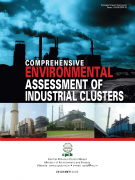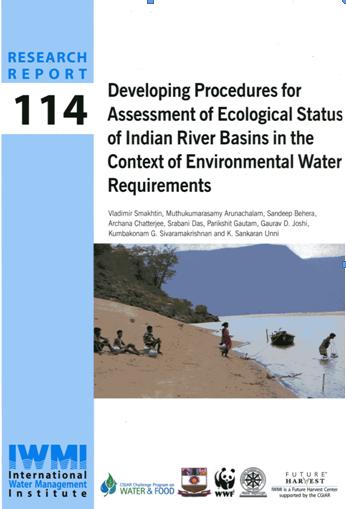Courses, Toolkits, Manuals, Guides and Handbooks
Measurement of weather parameters: Data collection and analysis – A presentation by ACWADAM
Posted on 24 Aug, 2010 09:29 PMThe presentation by ACWADAM deals with measurement of weather parameters and outlines the methods used in weather related data collection and analysis. Weather information is necessary for the planning and implementation of watershed programmes, especially in understanding factors like groundwater recharge, the relationship between recharge & discharge and in aspects like irrigation planning.
Augmenting groundwater resources by artificial recharge: A case study of Kolwan valley by ACWADAM
Posted on 24 Aug, 2010 04:19 PMThe presentation by ACWADAM deals with a case study of augmenting groundwater resources by artificial recharge in Kolwan valley, Mulshi taluka, Pune. The DfID funded project was undertaken by the British Geological Survey in collaboration with its partners in India from 2002–2005. The objectives of the study were:
- Improved knowledge of the impacts of managed aquifer recharge in different physical and socio-economic settings.
- Guidance on scope and effectiveness of managed aquifer recharge for implementers, funders and policy makers.
- Dissemination of knowledge.
Environmental flows A methodology of calculation for India (Part 1)
Posted on 24 Aug, 2010 10:07 AM
In order to maintain the ecological goods and services of rivers and other hydrological regimes like wetlands, lakes, etc., environmental flow allocations (eflows) are a necessity. At the same time, water demands in India are increasing and will keep increasing and solutions like waste water treatment, pollution control, correction of leakages and wastage of water, efficient irrigation systems, efficient agricultural systems, etc., will take considerable time to evolve, even with our best efforts. So what should we do in the meantime? There are vulnerable ecological systems on the verge of collapse..How do we respond to these challenges?
Pumping tests on wells: A means of measuring the storage and transmission properties of aquifers
Posted on 24 Aug, 2010 10:03 AMThe presentation by ACWADAM is part of the training module developed by them on “Planning, development and management of groundwater with special reference to watershed management programmes”. Pumping a well and observing the effect of such pumping on the water level in the pumped well as well as in the adjoining parts of the aquifer through observation wells is the basic procedure involved in a pumping test.
48% industrial clusters in India are critically polluted: CPCB
Posted on 10 Aug, 2010 11:38 PM A Comprehensive Environmental Pollution Index (CEPI) is a very useful tool to capture the health dimensions of the environment including air, water and land. The CEPI is intended to act as an early warning tool and can help in categorising the industrial clusters/areas in terms of priority of planning needs for interventions.
A Comprehensive Environmental Pollution Index (CEPI) is a very useful tool to capture the health dimensions of the environment including air, water and land. The CEPI is intended to act as an early warning tool and can help in categorising the industrial clusters/areas in terms of priority of planning needs for interventions.
This report by the Central Pollution and Control Board (CPCB) presents the results of the application of the CEPI to selected industrial clusters or areas.
The main objective of the study was to identify polluted industrial clusters or areas in order to take concerted action and to centrally monitor them at the national level. This was in order to improve the current status of environmental components such as air and water quality data, ecological damage, and visual environmental conditions.
Economics of River Flows - A book by Dr.Bharat Jhunjhunwala
Posted on 09 Aug, 2010 06:06 PMThis book is essential reading for economists, power sector officials, power generation companies and environmentalists alike.
Dr.Bharat Jhunjhumwala holds a BSc degree in physics, chemistry and mathematics. He earned his PhD in food and Resource Economics from University of Florida at a tender age of 23 years. He joined Indian institute of management, Bangalore as Assistant professor immediately thereafter. He lived in a slum for two years to understand poverty and organized the Trade Union at IIM during the Emergency. He resigned from the IIM and became a consultant to donor agencies like Swiss Development Cooperation, Oxfam, Care, Overseas Development Institute and others mainly on rural development and watershed issues. He writes a column on economic issues for about 50 newspapers in india. He lives on the banks of River Alaknanda in uttarakhand on the feet of Lord Badri Vishal.
Impacts of groundwater contamination with Fluoride and Arsenic: A report by CAREWATER
Posted on 04 Aug, 2010 10:25 AM
The field research study conducted by Carewater INREM Foundation attempts to establish the impacts of groundwater contamination with fluoride and arsenic in India. It maps the affliction severity, the medical cost and wage loss through a multi-location study in some villages in the States of Rajasthan, Andhra Pradesh, Karnataka and West Bengal.
K-East Ward Mumbai Water Distribution Improvement Project (WDIP): FAQs compiled by CASUMM
Posted on 01 Aug, 2010 03:58 PMThis document by Collaborative for the Advancement of the Study of Urbanism through Mixed Media (CASUMM) provides details about the K-East Water Distribution Improvement Project (WDIP) started in Mumbai, in the form of FAQs.
It argues that the very way in which the project is being planned and implemented, indicates that the agenda of the donor organisations is to gradually push for the privatisation in the water sector.
Relevance of Meltwater in River Basin Hydrology
Posted on 23 Jul, 2010 10:53 PMA peer paper in Science Magazine focuses on the core of a riverine system, the upstream basin, and its impact on the entire river basin.
Learning package for hydrology – A report by National Institute of Hydrology
Posted on 18 Jul, 2010 10:14 PMThe report emphasizes the necessity of Computer Aided Learning and presents a Learning Package on Hydrology covering various important elements of hydrology including the definitions and figures in a simple and straight forward language.
